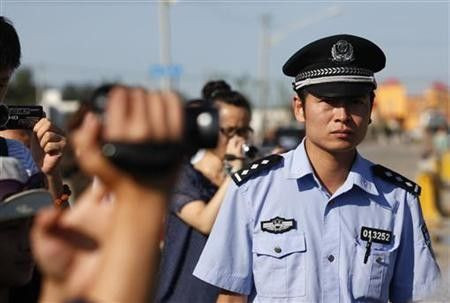China's Bodyguard And Private Security Industry Continues To Grow As Wealthy Chinese Become Targets For Crime

As China becomes the home of a fast-growing number of wealthy people, citizens have become more inclined to spend money on protecting their wealth and assets. For many, this includes protecting themselves and their family by hiring bodyguards.
Forbes’ China Rich List estimates that China has 168 billionaires, surpassing the previous year’s 113. According to a report by state-run Global Times, some of China’s wealthiest are scared that their money has made them a target for attacks or ransom. “Many rich people think it’ll be fine if they stay low-key. But that’s wrong, because many assaults come from people who are familiar with them, like family or employees,” Shi Xingfeng, the 30-year old CEO of Bojing Security Agency, said in the report. A recent incident in September when Zong Qinghou, the chairman of beverage giant Hangzhou Wahaha Group Co., Ltd., was attacked by a knife-wielding man near his home, was a wake-up call for the country’s wealthy entrepreneurs, Shi said. “But in recent years, I can see entrepreneurs are gradually realizing the importance of security services.”
Bodyguards and security services have become increasingly in high demand. Mou Xiaolong, founder of the Hong Kong-based Dragon International Bodyguard, estimates that there are about five bodyguard companies across China. On top of that, these private companies provide job opportunities for retired military or police personnel. “It’s also a good way to solve the problem of the employment of retired soldiers and police officers,” said Mou, noting that one bodyguard can earn many times the salary of a police officer or soldier.
In China, bodyguards function a little differently than they do in the West. “There’s a misunderstanding. Influenced by TV shows, many people think bodyguards are thugs, and fight when the client gives a command,” one bodyguard who goes by the name Cui told the Global Times. In reality, many of the best bodyguards are not overtly employed as such. Sherry, a female bodyguard for a family, operates under the guise of being a family assistant. Both Sherry and Cui go beyond just being brawny, having been trained in law, special driving, etiquette and secretarial work. "We want our students to be gentleman bodyguards,” Shi said. "If they can only fight, they are not a qualified modern bodyguard.”
Meanwhile, just like people in industries that have had to tailor to Chinese audiences, Chinese bodyguards focus their training on hand combat rather than firearms training. In China, according to Shi, combat skills and other physical attributes are sought after more than firearms experience is; as a result, the average bodyguard age is markedly lower than that of Western bodyguards. “I think many international bodyguard companies have tried to enter China’s market, but the other countries’ models are not suitable here,” said Pan Xiajin, who founded the Kingdom Bodyguard company in 2011.
© Copyright IBTimes 2024. All rights reserved.






















